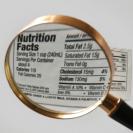For immediate Release: February 23, 2012
Montpelier, VT – The Vermont Right to Know GMOs coalition launched its campaign today in support of the Vermont Right to Know Genetically Engineered Food Act (H.722). This bill would make Vermont the first state in the nation to require the labeling of genetically engineered foods.
The bill, sponsored by Rep. Kate Webb of Shelburne, would address consumer concerns by requiring food sold at retail outlets in Vermont to be labeled if it is genetically engineered, or partially produced with genetic engineering.
“This is a very simple consumer right to know issue,” said VPIRG Consumer Protection Advocate, Falko Schilling. “Just as you can look at the back of a soup can and find out how many calories it has, we should all be able to simply check the label to see if the food we’re considering purchasing is the product of genetic engineering. Vermonters have a right to make informed choices about how they spend their consumer dollars, and the bottom line is that we deserve to know if we’re feeding genetically engineered foods to our families.”
“Giving the consumers more information about the origins of the food they are eating can only be good for business in Vermont,” said Daniel Barlow, the public policy manager of Vermont Businesses for Social Responsibility, a statewide business group with more than 1,200 members. “When faced with packaging that says ‘genetically engineered in a lab’ or ‘made fresh and organic in Vermont’ – the choice is pretty clear.”
Enid Wonnacot of the Northeast Organic Farming Association of Vermont highlighted the bill’s prohibition of labeling genetically engineered foods as “natural” saying “These laboratory methods splice together genetic material from combinations of plants, animals, bacteria and viruses to create novel plant and animal varieties that have never existed before and cannot occur in nature.”
Unlike the strict safety evaluations required for the approval of new drugs, the safety of genetically engineered foods for human consumption is not adequately tested. A growing number of studies indicate that genetically engineered foods may contain novel toxins, allergens, and other substances that can present real risks to our health. Labeling of GE foods will make it possible to identify and track any adverse health reactions that may occur as a result of consuming GE foods.
Vermont’s efforts have already garnered national attention, and received broad support from organizations and individuals in the state. Over 50 local and national organizations have signed on to the coalition, and over 1500 Vermonters have signed the coalition’s petition in support of the bill in just the past two weeks. Leading the coalition efforts are the Northeast Organic Farming Organization of Vermont, Rural Vermont, and the Vermont Public Interest Research Group.
“What we eat is intimately connected to our health and wellbeing” said Rural Vermont Executive Director Andrea Stander. “Our ability to make an informed choice about what we eat is one of our essential freedoms. Knowing how our food is produced makes that freedom to choose meaningful and powerful.”
It is estimated that over 70 percent of all packaged food sold in the United States is produced, at least in part, through genetic engineering. Yet consumers have almost no way of knowing whether a particular product has been genetically engineered.
H.722 is currently in the House Agriculture Committee where testimony is anticipated to take place early next week.
###

